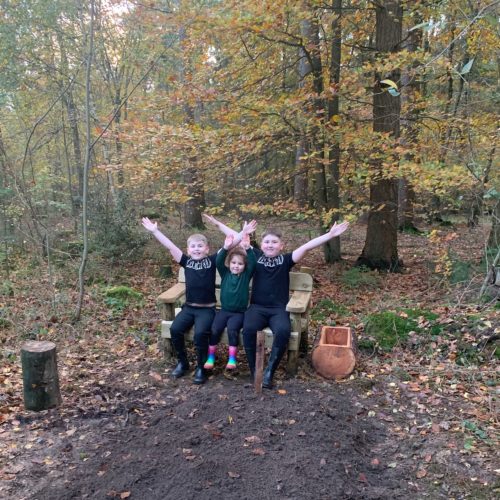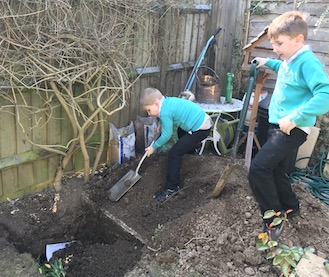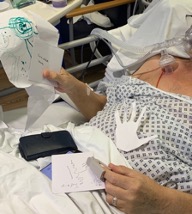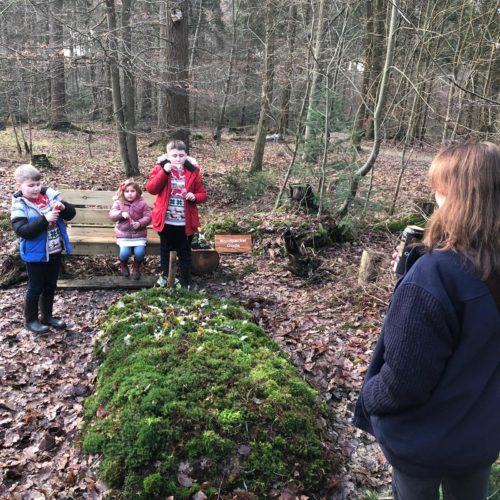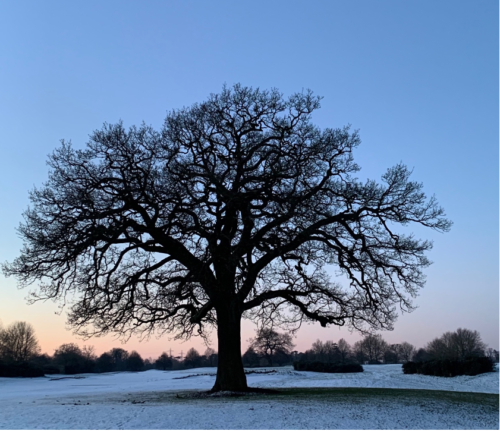
26th January 2021
Today it is 100 days since Steve died. And four months exactly since our wedding day.
At the weekend, it was the tenth anniversary of my mother’s death. It was a rapid dying, from glioblastoma multiforme. In January 2011, I spent my 50th birthday sitting by her bedside, where she drifted in and out of sleep. I knew it would be the last birthday I would have with a parent alive. She died nine days later.
January 2011 was not a good month for me. But I had unwavering support and love and strength that carried me through it. Steve was a huge part of that, despite the disconnect between my mother and him.
He was unfailingly present and prescient in his knowing what I needed, despite – or perhaps because of – having lost both his parents, less than 12 months before. Grieving when you have someone to lean on is so much easier than grieving alone. And, notwithstanding the unfailing love and concern and efforts of my wonderful children and collective of friends and acquaintances, this time, I am grieving alone.
January 2021 is not a good month for me either. A second significant birthday has come and gone; spent in a way I could never have anticipated. This one involved sitting in the pouring rain by Steve’s grave before returning to a subdued but lovely lockdown birthday afternoon at home. A birthday during lockdown is hardly a birthday. A birthday without the person you love so much is hardly a birthday. We’d had such plans to celebrate it properly, with a big family gathering making special memories. That was obviously before Covid changed everything we knew as normal in the world, snatching Steve away in the process.
January’s short, gloomy days and long dark nights are always difficult, but this time, this year, in these circumstances – they are almost unbearable. And then for me, these dates, these anniversaries have loomed, and then arrived.
This January is grindingly, relentlessly hard. It’s hard for everyone, this numbing existence of living under ‘lockdown’, all normal life in masked, socially distanced, restricted, isolated, suspended animation. Layer on top the exhaustion of hauling yourself through each lonely day trying to function like you used to, when everything you were used to has imploded, and life is bleak.
The one person I want to share my thoughts with isn’t here to listen. The one person I need to lean on has disappeared. I have no partner to help me get through these days, no harbour to shelter in, no safety net, no one to catch me and hold me. I have to do this on my own. The thought of time stretching ahead for me alone is too much to contemplate, it makes me recoil and shudder if I let myself look more than a day or two ahead. Just getting through one day at a time is enough of a task.
And it’s bloody hard. It’s hard to get out of bed each morning and pull on clothes and boots and get out into the cold early darkness to walk the dog. Often, I find myself a mile or so from home, walking on autopilot, stumbling in the darkness over the fairways and hills of the golf course as the skies lighten into dawn, not aware of how I’ve got there, not thinking, just walking.
It’s hard to go through the routine of showering and making myself look decent and half-heartedly cleaning and tidying the house. It’s hard to make myself focus on working again, sitting at the computer, writing emails and reports and sorting out endless admin. It’s hard to be a good ‘Nana’ to the children who I’m looking after regularly now to help Grace while she works. It’s hard – really hard – to go to the supermarket. I had no idea how much walking around Sainsbury’s would devastate me, the sharp pains of recollection, all of the memories and associations of seeing food and wines we used to buy when we were together.
And it’s hard to cook proper meals. I can’t smell or taste food since I had Covid, my palate now is determined by the texture of what I eat, and whether it’s sweet or salty or sour or spicy– beyond that, there’s nothing. There’s no point of going to the effort of trying new recipes, no point in spending time in the kitchen unless I’m cooking for the kids. It’s hard to force myself to eat anything, with little appetite and no enjoyment. Am not sure how much of that is Covid and how much is just the ‘can’t be bothered’ of being bereaved. I’m fortunate enough to have close eyes on me, making sure I don’t just exist on coffee and biscuits, including the children who ask me every day ‘What have you had to eat today Nana?’
Even something as simple and beautiful as the weekend fall of snow brought unexpected, jarring, painful memories, the cold crisp air and crunch under my feet immediately flashing me back to the many winter weeks we spent in Scotland over the years, lovely luxury weeks at Steve’s timeshare at The Carrick, just the two of us relaxing together. Memories of long walks in the mountains, tramping through the snow, his warm hand steadying me, his warm breath against my cheek when he kissed me, memories of building a snow bear outside the lodge, of evenings walking back from Cameron House in the icy chill and silence of the banks of Loch Lomond. Those memories are hard to bear now.
Everything about this new normal, this January, is unremittingly hard.
I’m sure that for anyone whose partner has died, this time – 100 days after a death – this period of grieving must be equally difficult, even without the complications and stresses and anxiety of living through a pandemic, in a country which has handled it so utterly appallingly.
These are horrendously difficult times. The constant dreadful news, the media drip feed of death rates and infection rates, the politicians pronouncing orders, the changing restrictions, the horrors endured by the NHS staff battling to keep people alive as their lungs stiffen and their organs fail, the prospect of this going on and on with no end in sight – all of this existential nightmare just echoes and magnifies the inner dread and distress.
Even under normal circumstances, three months on from a death, other people’s lives have moved on. The regular phone calls and messages slow down. People are busy and have their own lives and complications and families and work demanding their attention. It’s normal that the focus has shifted away from me and my experience, my existence. But that natural ebbing of constant checking-in means that I have to call on my own resources to keep going forwards. And my resources are elusive and eroded by what has happened. My usual resilience has taken a body blow with this, the latest traumatic event in my life. I’m older, and less buoyant, more battered. The two years of living in constant vigilance with the worry and knowledge of the insidious, inevitable advance of Steve’s cancer has taken its toll. I’m running on empty.
And there’s no manual, or guidance. This is a long, gruelling, weary journey of self-discovery which I didn’t choose and don’t want to be doing. I’m trying every which way to make it easier, doubling back on some of my choices when they turn out not to be the best ones. I found that the grim nights of loneliness and crying at the beginning were eased by pouring a hefty slug of whisky when I went to bed, but I’ve realised that wasn’t the smartest thing to be relying on, so I have stopped buying bottles of single malt and substituted the oblivion of alcohol with restless, relentless insomnia.
I’m doing my best to use the knowledge I have and apply it to myself, but it’s proving hard to put into practice. I have playlists on Spotify, meditation apps on my phone and a growing pile of books that I have bought, and half read before discarding. I make warm milky drinks with turmeric and manuka honey, I have a journal by my bed in case I need to write stuff down, lavender oil on my pillow in the hope that the essential properties will work even though I can’t detect them through smell – and yet still I am awake at 4am, writing this, having not slept at all. There’s no point in trying to sleep now, so this will be another sleepless night. And so, the exhaustion accumulates. Which makes everything that’s already hard a hundred times harder.
I’m trying though. I’m doing weekly group Zoom sessions with other people whose partners died from Covid. I’m practising Ho’oponopono, I’m using EFT. I’m eating sufficiently and taking vitamin supplements and drinking loads of water and trying to tire myself physically in my permitted exercise each day. I visit Steve’s grave. I talk to him all the time. I spend as much of the day outside as I can, appreciating birdsong and the quiet of nature in winter. I lean against big, old trees, pressing my face into the bark and try to feel the ancient strength of these witnesses to the changing years and the turmoil of human life.
I’m still doing my daily early morning walks before dawn. I’m writing. I’m working. I play with the children. When I need to talk, I call one of my trusted friends. When I need to call up comforting memories I look back at photos. I now have an album of wedding photos and an album of funeral photos – both equally beautiful. And I’ve just had a book created by Zapptales of our WhatsApp messages and I leaf through it to reconnect with the vibrant, alive love that we shared. That love glows from the pages in our conversations about all kinds of mundane things – telling each other how much we missed each other when we were apart, letting each other know where we were and what we were doing, what time we’d be home, hundreds of photos, hundreds of ‘miss you’, ‘love you’, ‘love you more’, ‘xxxx’ messages, stretching back to 2010, and ending with my last message sent at 06.22 on the day the hospital would call me in because he was dying.
I try to avoid obvious triggers, like programmes showing the reality of what’s happening inside our hospitals as Covid patients overwhelm the NHS – it’s too raw, too painful, too recent. But I’m keeping going, as I promised Steve I would.
And I remind myself that if he had survived, Steve would still have been slowly dying from cancer, and hard as this is for me now, to still have him here in increasing pain and suffering, while living in these dreadful restricted circumstances in these dark winter days would have been utterly unbearable.
I note with horror the huge numbers of people in hospital with Covid now and am so very glad that when Steve was admitted the numbers were so much lower – 2,705 people were in hospital in England with Covid on the day he was admitted. On Sunday, there were 32,907 Covid patients in English hospital, according to NHS Statistics – more than twelve times as many people being cared for, by the same exhausted nurses and doctors. Harrowing as it was for Steve to be in hospital in October, gradually succumbing to the virus, how much worse would it be now?
And this week, as the number of British people dead from Covid is certain to reach 100,000 – ONE HUNDRED THOUSAND!!!!!!!! – I remind myself that I am just one of many thousands and thousands and thousands of people going through this right now, grieving the loss of our lovers, all of us on our own.
I’m 100 days into this new life. I don’t like it. I’d do anything not to be here, right now, in this reality. I wish so much I could be back in our old life, pre cancer, pre Covid. Just living our life together. I don’t think I ever truly appreciated just how happy I was, how utterly secure and safe I felt. Now that’s all gone, I look back in wonder at just how lucky we were. And I look forward to what lays ahead with such sadness at being left on my own.
But this is it for me now. Now I have to make my own way. What has sustained me through these last 100 days – and will sustain me through the next however many hundreds or thousands left to me – is the certain knowledge that Steve loved me, to the absolute, utmost of his ability.
This wonderful, magnetic, hugely popular, universally loved man, this chameleon, this complex, complicated, fallible, fabulous human being fell in love with me. He chose (at huge cost) to be with me – and he chose to stay with me. He committed to me. As his life began to draw to a close, he chose to marry me, to have our long relationship legally recognised, to pledge himself to me, fully and completely and publicly. He chose to let me accompany him through all the twists and turns of his illness, all the way to his death. He held my hand in his as he took his last breath. He loved me, he loved me as much as I love him.
A few days before he died, he spoke about a conversation that he had had with his father, shortly before he, in turn had died, in 2010. It had been a difficult conversation, one where Steve had had to tell his parents that he was leaving his marriage to be with me. Labouring with his breathing, on a video call from the hospital, Steve said, ‘My Dad was right’. When I asked him what he meant, he told me the conversation that he was referring to, and said, ‘Dad just said, ‘It’s her. You’ve found her. You’ve met your soul mate’.’ He had never told me this before. For him to share this with me, when he knew his death was fast approaching was, I know, confirmation that he too believed this to be true.
And so, no matter how deeply despairing I feel, no matter the maelstrom of feelings I am having to contend with, no matter what has occurred, I know, without doubt, that Steve and I shared an extraordinary love. I will always love him. He is, and always will be, the love of my life. And I know with absolute clarity that he felt the same, and he wanted me to be certain of that.
I need to hold on to that certainty. That knowledge is what will get me through the days that lie ahead. And I’ve got work to do, we at the Good Funeral Guide have got work to do. Vital work. In these traumatised times, as never before, there is such a need for trustworthy, impartial information about the importance of a good funeral. We have to make sure that people can find it when they need it. And we have to make sure it is as good as it possibly can be.
And also, I now have unwanted – but invaluable – first-hand experience of profound grief, at a time when the country and the world are reeling in shock at the impact of the pandemic and the deaths of millions of our brothers and sisters across the world. I have to turn this around and find something positive. I want to use what I’ve learned to help other people, to articulate and shine a light on the impact of love interrupted by unexpected, traumatic death. There are so many of us. Our stories need to be heard.
This Marianne Faithfull track has just played on my playlist, and the lyrics really resonate with me as I finish this piece. I love it, I love her raw, powerful voice, and her words make sense to me where I am at the moment – apart from the ‘no one to blame’ line – for the 98,531 British people whose lives have been taken by Covid, including Steve, there is so much blame. This did not need to happen.
We have the highest death rate in the world from this virus. It is outrageous. It is devastating. And it is unforgivable. These deaths did not need to happen when they did, the way they did. Steve and the 98,530 other people who are dead because of Covid died because of the government’s negligence, arrogance, exceptionalism and refusal to take the measures that would have kept the virus to a minimum.
There has to be culpability. This carnage, this catastrophe could have been avoided if the warnings had been heeded and our government had truly wanted to protect us. I knew about the virus in January 2020 from following social media, and I alerted members of the Good Funeral Guild on January 27th – if I knew, you can be certain the government knew long beforehand and in far greater detail about the threat that the virus in Wuhan posed to us all. But nothing was done to protect us. And almost a hundred thousand of us are now dead.
This is why I am fiercely proud to support Covid-19 Bereaved Families for Justice UK in their campaign for a public inquiry into the government handling of the pandemic. Along with everything else that I have ahead of me, I will do what I can to help call for justice for all those who have been so murderously let down.
I’ll end this long post now. Here are those Marianne Faithfull lyrics. Do listen to it.
Born to Live
“Born to live and born to die
Aren’t they just the same?
We’re always breaking someone’s heart
Especially our own
Life goes on its joyful way
As usual nothing’s as it seems
But to die a good death is my dream
And I wish it for all, for all I know and love
Deep down below and high above
We’re born to die, no one to blame
We’re born to love, we’re all the same
Blues stay away, stay away from me
I hate to lose old friends
Blues are my enemy, but love gets me through
Born to live and die
Forever loving you
Don’t make me cry, know what I must do
Pray for a good death, one for me, one for you
And I wish it for all, for all I know and love
Deep down below and high above
We’re born to die, no one to blame
We’re born to love, we’re all the same”
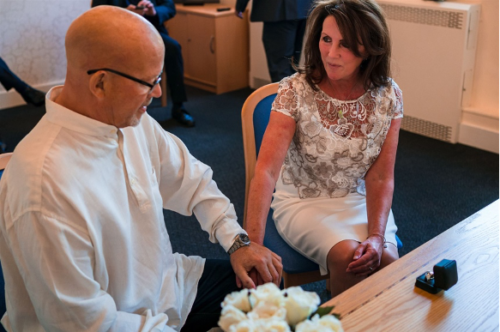
26th September 2020

